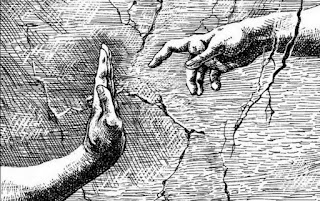Dateline: WASHINGTON, D.C.—Horace Mollycoddle, political
pseudoscientist at the Machiavelli Institute, has theorized in his interview
with Subversion Magazine, that being morally right on the political issues is
correlated with being a wimp or a sissy, which is why politicians who need to
best each other in the bloodsport of politics either can’t justify their
policies or are unwilling to fight for what’s right.
Quoting Yeats, Mollycoddle said, “The best lack all
conviction, while the worst are full of passionate intensity.”
Liberalism is more rational and ethical than conservatism,
according to Mollycoddle, and liberalism entails assigning equal rights to
women and minorities “whose feminine interests and slave morality rub off on
liberal men, draining liberals in general of the strength to wage war on the
manifest villainy of so-called conservatives.”
Thus, in the United States, Republicans trounce Democrats
and “push their odious ‘free-market’ policies of plutocracy and their
anachronistic and incoherent family values to evermore insane extremes. Alternatively,
liberals somehow scrape together a victory, but lack the stomach to apply their
progressive principles, as in the case of Bill Clinton or Barack Obama.” Mollycoddle
added that Hillary Clinton would likewise have governed as a neoliberal
centrist, had she defeated Donald Trump in 2016.
Mollycoddle therefore posits a Wuss Factor that renders
liberals “girly-men,” as Arnold Schwarzenegger called them. “This is the
flip-side of Obama’s famous lack of ‘drama’: he didn’t create any drama while
in office only because he didn’t care about anything, which is why, in turn, he
didn’t fight for anything.
Obama’s defenders have said he’s cerebral rather than
spineless or nihilistic, but Mollycoddle contends that “intellectualism, as in
Woody Allen’s perennial movie character or Dostoevsky’s ‘mouse’ in Notes from the Underground, can provide
cover for cowardice.” Instead of admitting to “a lack of the irrational inner strength
that’s often needed to take decisive action, the hyper-aware intellectual will
rationalize in an endless cycle of doubts and half-measures.”
Obama didn’t fight for a public option in the healthcare
debate, said Mollycoddle, and so he will “suffer the irony that ‘Obamacare’ may
be repealed even though Obama’s Affordable Care Act wasn’t at all a progressive
alternative but was a conservative, Romney-style non-solution to the problems
with the American healthcare system. And when he discovered that Vladimir Putin
was waging cyberwar against the US in its 2016 presidential election, Obama
dithered and choked instead of punishing Russia.
“Ultimately,” Mollycoddle continued, “this is because it’s
impossible to be both moral and manly. To be sure, the liberal’s heart will
always be in the right place. Unfortunately, this means Obama, Bernie Sanders,
Elizabeth Warren, Nancy Pelosi, Jimmy Carter, or any other liberal leader
necessarily lacks the killer instinct to destroy his or her enemies.”
Ordinarily, in a healthy democracy, politicians would have
“no need for battlefield virtues, no need to attempt to systematically annihilate
their rivals,” because both sides would have the common welfare in view and
would gladly compromise to retain the nation’s dignity.
But the twenty-first century American political system is
“evidently dysfunctional” and “the so-called conservatives are actually radical
anarchists who seek to further impoverish the majority of Americans to benefit
the wealthiest one percent who have no need of any social safety net, since
they live in their own worlds.”
Mollycoddle then cited Lewis Mumford on the Rabelaisian
culture of the sixteenth-century Country Houses in Europe: “The conditions
which underlie this limited, partial good life are political power and economic
wealth; and in order for that life to develop well, both of these must obtain
in almost limitless quantities. Honest labor cannot achieve such wealth or
command such leisure: it is possible only through privileged exploitation of
the resources and labor of an entire country, for the benefit of a minority.
The ease, the grace, the dignity, the spacious days of this society are
therefore purchased at the price of the toil, the constriction, the ceaseless
economic anxiety of the mass of the population: not only at home but in the
exploited territories abroad. Under all its patent refinements goes a ruthless
monopoly of land and political power. Force and fraud, either remote or recent,
are the twin foundations of Country House existence” (The Condition of Man).
“The reason conservatives rig the American economy,” said
Mollycoddle, “is to recreate that grotesque inequality. It’s a war of princes,
lords, or plutocrats against the planet in general, but particularly against
the majority of mere ordinary mortals.
“So conservatives haven’t a prayer of being anywhere near
right on the issues. Their political views are so many loathsome, decadent
monstrosities or bestial sneers and postures. But they inevitably end up on top
because liberals are pussies, and the reason liberals ‘lack all conviction’ is
precisely because they’re in the right.
“Morality itself is the Wuss Factor.”







